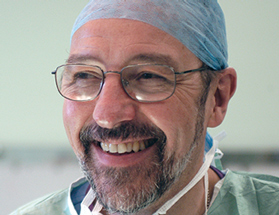
Professor Neal, who is Professor of Surgical Oncology at the University of Cambridge, has been given the award by the Queen, in the New Year Honours 2014 list, in recognition of his services to surgery.
Professor Neal pioneered the introduction of robotic surgery for prostate cancer at Addenbrooke’s Hospital in 2006. The da Vinci surgical robot has revolutionised prostate surgery enabling surgeons to carry out minimally invasive surgery with greater precision. The method reduces blood loss and other complications associated with traditional open surgery, allowing men to go home sooner. Addenbrooke's now runs the largest prostate cancer surgery service in the UK with the shortest length of stay. Almost 100% of prostate operations in Cambridge are carried out using the state of the art robotic surgery compared with a national average of just 20%.
‘I am honoured and delighted to receive this award. I’d like to highlight the dedication and hard work of my wonderful colleagues here at Addenbrooke’s, and also at the Cancer Research UK Cambridge Institute and the University of Cambridge, to improving patient care,’ Professor Neal said.
Professor Neal, who came to Cambridge in 2002, said that he was humbled by the patients he treats, ‘Working with people who have cancer is extremely inspiring because of their courage in dealing with this difficult disease and because they are determined to help us with our research to improve things for those who come after.’
As a key member of the Executive Committee of the Cambridge Cancer Centre, Professor Neal’s vision is to link excellence in cancer diagnosis and care with translational research to achieve better outcomes.
Over 40,000 men each year in the UK are diagnosed with prostate cancer and over 10,000 of them will die. Current diagnostic methods involve measurement of prostate specific antigen (PSA) followed by a potentially uncomfortable and dangerous ‘random’ trans-rectal biopsy (TRUSP). This approach misses many cancers and over-calls the presence of cancer leading to many men having unnecessary biopsies. Many of the cancers are of low-risk, leading to over-diagnosis and over-treatment of some men. Conversely, the outcomes of men with high-risk disease are not good and need improvement. Targeting earlier diagnosis to high-risk individuals and populations is critical, and Professor Neal’s research group is developing novel genetic risk markers and biomarkers, along with new imaging techniques to improve diagnosis.
On his work on the most aggressive forms of prostate cancer, Professor Neal explains, ‘Our research is aimed at better understanding biological features that determine poor outcomes so that we can stratify risk, and personalise treatment with newer agents. We are working with the Wellcome Trust Sanger Institute, the Institute of Cancer Research at the Royal Marsden Hospital in London and the University of East Anglia to carry out sequencing studies to identify mutations that underpin different sub-types of prostate cancer.
‘We are also carrying out studies of the protein receptor for the male sex hormone, the androgen receptor (AR), which is critical to prostate cancer development and growth. We have done a ‘first-in-man’ study investigating where the AR binds to DNA and how it regulates growth. We have shown that many AR binding sites are found only in tissue, rather than in cell lines, and that many of these sites are functionally important and regulate pathways that are potentially druggable. We have developed the concept of ‘window trials’, which are studies done using imaging and biological end-points in men treated with short courses of novel drugs prior to surgery or radiotherapy. These studies are important for patients, science and for pharmaceutical companies.’















